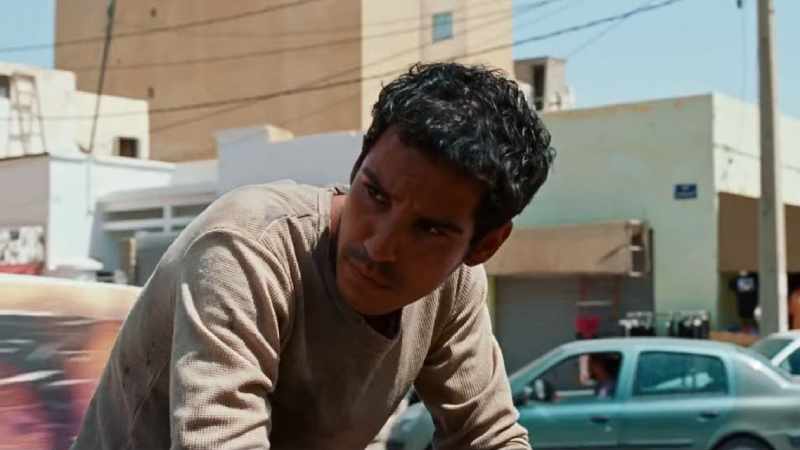




Ali’s mother passed away when he was young, and now his father too has departed from this world. Twenty-something-year-old Ali (Adam Bessa) is left to take care of his two teenage sisters. They live in a modest yet functional dwelling in an unnamed Tunisian city. One day, a debt collector knocks at their door and tells Ali that they are about to face eviction. The doting elderly brother immediately sets off on a quest to raise the money and rescue his family from impending homelessness. Sounds trivial? Well, this is an ordinary story of broken youth told with extraordinary skill and flare.
Working informally as a petrol vendor on the busy streets of his town, Ali is unable to raise a large sum of money as such. He attempts to land a job in his father’s company because he’s been told that there is a tradition that the heir should fill the position of the prematurely dead. He does not succeed. He tries social services and other legal routes, but the various authorities slam the door on his face. He travels to the seaside and asks an old friend working on a beach resort for help, to no avail. This is where he sees wealthy people enjoying an extravagant lifestyle, wineglass to hand, and the social abysm between them becomes apparent.
Inevitably, Ali slips into petty crime. This then escalates into something much bigger and more ambitious. He becomes involved in a network of crime involving gangsters and a very corrupt police force. Ali is never guided by ambition, but instead by the urge to provide for his family. His anguish is palpable, his choked indignation and his latent anger both printed on his face. His rage becomes increasingly explosive. Ali is a ticking bomb. Bessa delivers an electrifying performance bursting with passion and humanity, supported by a thumping, energetic music score.

Ali often sleeps outside his house, leaving his perplexed sisters wondering why. It’s as if he wanted to shelter and protect the two young females from his erratic life style, thereby preserving their innocence and integrity. All that’s dirty must be kept outdoors, cigarettes included. In a revealing scene, Ali approaches a young woman entering a car with a “for sale” sign in order to obtain more information about the vehicle. He is abruptly reprimanded by her father, who refuses to share the price. “I know you type”, the older man exclaims. He is yet another player in a society that insists in marginalising its young people.
At times, it is Ali’s younger sister that narrates the story from her very own ingenuous perspective, adding a layer of tenderness to the story. Her performance too is credible and captivating. Sadly, others fail to sympathise with our hapless protagonist. They are either indifferent or complacent. Be prepared for an astounding final scene bursting with poetry and drama.
We briefly hear and see a television report about a wave of self-immolations in Tunisia, already in the first third of the movie. This movement was started by Tarek el-Tayeb Mohamed Bouazizi, a young street vendor who set himself on fire in response to the confiscation of his goods and the subsequent humiliation that municipal officers imposed on him, in a predicament extremely similar to Ali’s. These people became a catalyst (no pun intended…) for the Tunisian Revolution and also for the wider Arab Spring in the neighbouring nations. By providing viewers with such knowledge early into the story, the director immediately raises the question: could this be a harbinger of the fate of our protagonist?
Harka was in the Official Competition at the 2nd Red Sea International Film Festival, when this piece was originally written. Adam Bessa won this year’s Un Certain Regard Best Performance Award in Cannes (tied with equally mesmerising Vicky Krieps in Marie Kreutzer’s Corsage). In UK cinemas on Friday, May 5th.











